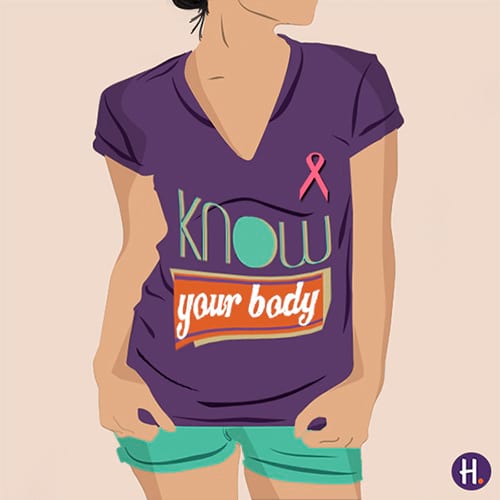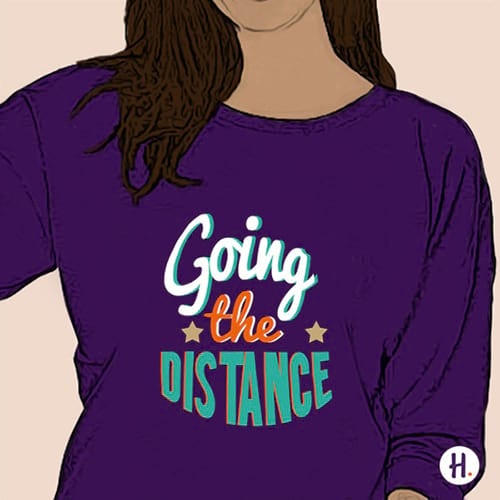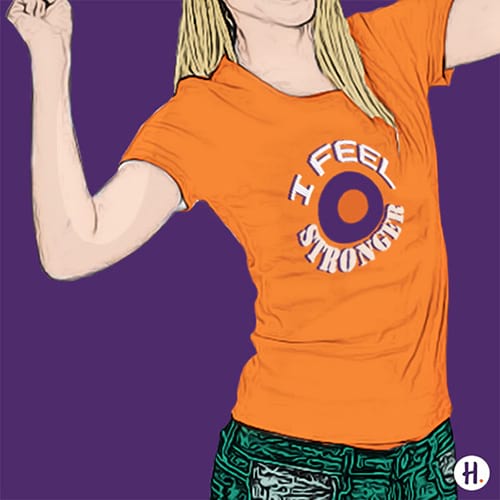It was a long journey but my kids were a great help and quickly learned to hang up laundry and vacuum for their mom.” – Lee-Ann, Hollardite & breast cancer survivor.
Awareness saves lives. That's why Hollard supports Breast Cancer Awareness Month. Early detection of breast cancer is vital. With regular self-exams and mammograms, you can take control of your health. And you should know that you are not alone. This month our Hollardites reach out to share their brave stories of hope and survival with you. Please join us for a celebration of the power of love, family and friendship during this tough journey.
Lee-Ann: Always looking for the positives

“It was November 2009. I had a meeting at work and I came out feeling a bit anxious because the meeting hadn’t gone so well. All of a sudden I had pain and I put my hand there and felt it. It was quite out of the blue,” she explains.
Diagnosis and treatment
Lee-Ann underwent a needle biopsy. The doctor removed some cells by inserting a needle into the lump she had found. The doctor confirmed the presence of in situ breast cancer. The cancer cells hadn’t moved into the surrounding tissue yet but the doctor decided that a mastectomy (surgery to remove the affected breast) would be the best course of action.
During the mastectomy, it was discovered that the cancer was invasive.
“It just shows you that things work in mysterious ways,” says Lee-Ann. “Had the surgeon done a lumpectomy (surgery to remove the lump), he may have missed the fact that the cancer had spread.”
Her medical aid paid for the mastectomy, breast reconstruction surgery and breast reduction surgery. “When I told my husband that they wanted to do the mastectomy he suggested that I go for a reduction at the same time because he knew I wanted it”.
Lee-Ann also has critical illness cover with Hollard and another insurer – both policies paid out. “It was one of the best things I could have done,” she says. “I had to buy a special bra that cost R250. That’s where the critical illness comes in. It just helps with little things like that.”
Recovery
Today Lee-Ann is cancer-free. She makes a point of seeing the positive aspects of her experience with breast cancer. But that doesn’t mean it was easy.
“It was a long journey,” she says. “The first year you go into denial. You don’t realise how depressed you really are”.
Lee-Ann received strong support from her husband and two children, who were by her side every step of the way. She found it hard not being able to be as active as she usually was but her kids were a great help and quickly learned to hang up laundry and vacuum for their mom.
Lee-Ann’s ability to do her job wasn’t affected, but that doesn’t mean that going back to the office was a smooth transition. “I was a lot more anxious than normal. I was quicker to lose my temper. It was just that anxiety and stress of wondering whether anything is going to go wrong and if everything is going to be okay.”
Advice
The number one piece of advice Lee-Ann gives to women who are fighting breast cancer is to speak to other women who’ve been there. Her advice to all women is to have good critical illness cover and to go for annual check-ups – even if they’re afraid. “Know your body. You know when something’s wrong. I’m a firm believer in God and angels. I believe that they watch over you constantly and they give you warning signs. You’ve just got to pay attention”.
Naomi’s Story: Cancer-free for eight years

I was diagnosed with breast cancer in 2007, at age 34. Scary! The world as you know it changes forever.
I had a lumpectomy and reconstructive surgery at the same time. The doctors use the muscle, fat and skin from the back (a latissimus dorsi flap) to reconstruct the breast. I emerged kind of looking the same with clothes on, but underneath it was a different story. After the operation, I had six months of chemo, followed by six weeks of radiation, followed by five years of hormone therapy. Phew. If I had a penny for every hour spent in doctors’ waiting rooms I could stop working.
People told me that breast cancer is the best kind of cancer to get. My reaction was “Wow! How could you be so flippant? This is horrible!” But in retrospect, I guess it is – it is certainly the most treatable form of cancer if caught early enough.
I was one of the lucky ones – my cancer did not spread to the lymph nodes and, touch wood, to date has not metastasised. I have been cancer-free for eight years and still going strong!
Coping with cancer treatment
Having cancer changes you, and people will react differently. For me, information was everything; I read up on EVERYTHING. But it helped me to understand what was happening and to know what to expect. The support group thing didn’t do it for me. But it works for some people. Talking about it helps.
Chemo sucked – not the greatest thing in the world to go through, but then again, also not the worst. Whilst others were affected by my chemo brain, I was blissfully unaware of my lack of short-term memory. Things tasted differently and eating lost its pleasure. I was expecting weight loss but the opposite happened thanks to the cortisone. But I did not battle with nausea. My husband (who was still my fiancé at that time, kudos to him for sticking this out ) got loads of experience doing the grocery shopping – a very helpful habit I thought he should keep up.
Losing my hair also turned out not to be such a big deal – it grows back! I didn’t do wigs; hats and caps were fine. You might feel like you’re standing out like a sore thumb, but in public people mostly don’t even notice.
Family, then and now
This is a life-changing experience and I could not have done it without my family and the support of my husband.
Having cancer delayed my decision to have kids because I could not fall pregnant while on hormone therapy, and I went into chemo-induced menopause. After hormone therapy and having turned 40, the pressure was too much and it rather cemented the decision to not have kids. I guess I’ll always wonder if I would have had children if I didn’t get cancer. Who knows? For now, I’m just happy to be alive and well and in remission.
Caroline’s story

My name is Caroline and I am a cancer survivor!
I was diagnosed in 2011.
I used to check my breasts regularly as my sister had passed on from cancer.
I had pain and there was a lump in my breast. I didn’t have medical aid, so I had to go to our local clinic. At the clinic, I was turned away. The sister told me I was just fat.
Knowing myself and my body, I knew something was wrong. And I am not fat!
I went back to the clinic and asked to see the doctor because I knew it wasn’t normal for my breast to be so painful.
I saw the doctor and she did a biopsy. I had to wait six weeks for my results. Again I was turned away; again they said I was fat and that nothing was wrong.
By then I was really fed up and decided to see my GP.
He referred me back to the clinic. And the clinic referred me to the Steve Biko Academic Hospital. I am sure you can imagine how I felt by then.
At Steve Biko, I went for a mammogram and more tests. I met Dr Minnie, and she told me it was Stage 2 cancer straight away. She advised me to have a mastectomy because the chances of survival are so much higher than with a lumpectomy.
There were no beds available at that time. So my GP suggested chemo while we waited.
I prayed about it and went for the chemo. In the oncology section, I met Dr Klibanoff. She told me to take my meds on time to be well. I take them once a day, every day, and have for the past five years.
Sustained by faith
Being a Christian, I surrender all to God. I pray about my health. So it was not so difficult. I prayed before my chemo sessions. I had six sessions, of which four were after the operation. I then went for radiation. I went every day for six weeks. I was bald.
I had a lot of support from my colleagues, my neighbours, and my family. Without them, I don’t think I would have been able to overcome that ordeal.
Last year I went for a general check-up and the doctor found a cancerous growth in my uterus. I had a hysterectomy in July 2015.
I thank the dear Lord for keeping me strong and positive. I thank my pastor for showing me the way. I thank my family, my late mother-in-law, and my co-workers for their support and love.
When I look at my breasts, I feel stronger. Not for one moment do I feel less than a woman. I am alive, I am well, and I am a child of the highest!
And death is not my portion!
I am going for a mammogram on the other breast in March 2016. I am positive and know all will be well.